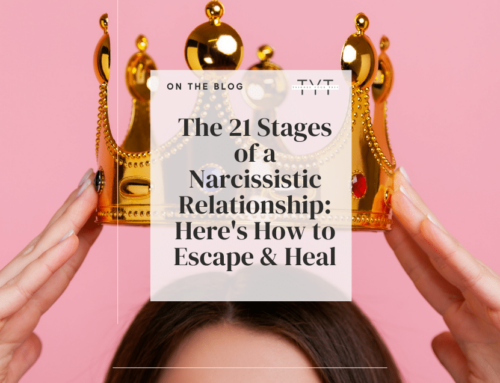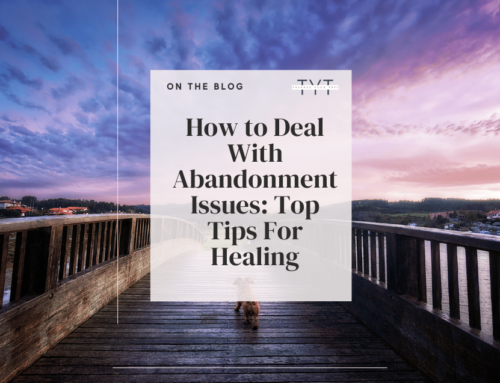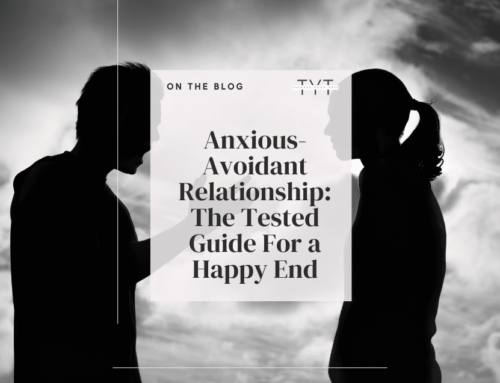Are you feeling emotionally manipulated and controlled in your most intimate relationships, reacting in a harmful and destructive way? Do moments of self-doubt, regret, and hurt seem to linger long after every interaction? If so, reactive abuse might be at play.
Reactive abuse triggers our concealed insecurities, subconscious childhood trauma, or rooted attachment issues. We might become the monsters we fear, often seeing ourselves trapped in a vicious cycle that empties our souls of any spark left.
We want to make it stop — yet we’re stuck. Similar, but not equal, to codependency, the emotional loop we’re feeding makes us vulnerable and unable to act responsibly and healthily. We forget boundaries and self-respect. All we know is lashing out with revenge, anger, and hurt.
And then, this narrative plays against us. The damaging relationship dynamics can now define who we are. We’re pushed toward this breaking point, and somehow, we become the abusers.
The ones who became aggressive. The ones who yelled, screamed, shut the door, lost control or self-restraint, and broke into tears.
It’s time for a change – it is possible to break free from the psychological toxicity cycle resulting from emotional manipulation. After reading this article, you’ll be able to recognize what triggers this behavior and learn how to regain control over yourself.
Striving to Interact More Healthily?
Reactive abuse can be damaging to your physical and emotional health, and it can escalate over time. If you’re in a narcissistic relationship with someone who engages in reactive abuse, it’s essential to seek professional help. Getting couples therapy and getting in touch with a mental health professional might be the only key to stopping it.
Do you have difficulty choosing a mental health professional? Can’t afford in-person couples or individual therapy?
This online therapy toolbox is more efficient and affordable than any other virtual therapy I’ve tried, including BetterHelp and Talkspace. It instantly matches you with a therapist and saves you hours of research for the right one (with unlimited daily messaging and support from your therapist). By leveraging the power of CBT (Cognitive Behavioral Therapy) -the most common psychotherapeutic approach for treating mental health problems- your therapist will guide you to a happier self through weekly sections, CBT worksheets, unlimited messaging, and daily worksheet replies. Bonus price for the fact that you can do your sessions wherever you are in the world and message your therapist anytime, daily.
What Is Reactive Abuse?
Reactive abuse is a term used to describe the angry, explosive, or violent behavior that occurs in response to someone else’s abusive, controlling, and manipulating actions. It’s most commonly seen in relationships where one partner is a narcissist, as they may respond angrily or violently to perceived slights or threats to their fragile self-image.
But how does reactive abuse start, and what causes it? Reactive abuse occurs in response to the victim’s actual or perceived threat. What characterizes it is the dysfunctional interaction, usually in the form of escalation of cruelty, manipulation, and control between two people. It can start when one side tries to undermine the victim’s sense of self-worth, stability, and safety. It can also occur through gaslighting, creating doubt, fear, and anxiety.
Another example of subtle and covert reactive abuse is when the abuser feels threatened by their partner’s independent streak or has trouble dealing with their success or strength, so they try to control or manipulate them long-term. Reactive abuse can happen in any relationship, but it’s most common in intimate partnerships.
However, it can also occur in other situations, such as when an employee reacts angrily to a boss’s criticism which triggers a trauma response. It can also occur in mutual abuse situations where both people are engaging and responsible. Reactive abuse is harmful and destructive, as it can escalate the conflict and lead to mental health issues or even domestic violence.
Related: 35 Best Karma Narcissist Quotes that Will Shake Your World
What Are The Five Types of Abuse?

Abuse can take on many forms, and emotional abuse is especially difficult to recognize at times. Because intimate relationships differ so significantly, so can the types of abuse. Here are the five most common types of abuse.
-
Physical violence or domestic violence
Physical violence or domestic abuse is a pattern of behavior characterized by the use of physical force with the intent to cause fear or injury. Domestic abuse can occur between family members, intimate partners, or roommates.
Victims of domestic abuse may experience a wide range of mental health issues, including anxiety, depression, post-traumatic stress disorder, and difficulty trusting others.
They may also have difficulty concentrating, sleeping, or eating. In severe cases, victims of domestic abuse may attempt or succeed in suicide. Do not tolerate physical abuse; seek help immediately.
-
Psychological or abuse
Psychological abuse is a type of maltreatment that can have serious negative consequences for both children and adults. It can involve a range of abusive behaviors, such as derogatory name-calling, threats, shaming, judgment, criticism, or ignoring boundaries.
Psychological abuse can occur in all types of relationships, including those between parents and children, siblings, spouses, and roommates.
It can also occur in different settings, such as the workplace or online interactions.
Psychological abuse can have a profound impact on mental health. It can lead to depression, anxiety, and post-traumatic stress disorder. It can also interfere with personal relationships and disrupt social bonds.
-
Narcissistic abuse
Narcissistic abuse is a form of emotional abuse inflicted by a narcissist on a partner, child, or family member. Narcissists are manipulative, controlling, and often abusive people who lack empathy for others.
They may use various forms of coercion and intimidation to control and manipulate their victims. Standard features of narcissistic abuse include gaslighting, devaluation, verbal abuse, emotional manipulation, hyper-criticism or dismissive behaviors.
Gaslighting is a form of psychological manipulation in which the narcissist convinces the victim that they are crazy or delusional.
-
Reactive abuse
Reactive abuse is a form of emotional abuse that occurs in response to the actions of another. It is often directed at those who are perceived to be a threat to the narcissist’s ego or position of power.
Narcissists are especially susceptible to reactive abuse because their inflated sense of self-importance makes them quick to anger and slow to forgive.
They may believe they are entitled to mistreat others since they see themselves as superior. As a result, narcissists are often manipulative and controlling individuals who seek to dominate others.
-
Sexual abuse
Sexual abuse is severe domestic violence involving rape or forcing a victim to engage in sexual acts unwillingly. It’s the worst kind of abusive relationship, and victims of sexual abuse suffer long-term mental health consequences.
If you’re suffering from sexual abuse, call the national domestic violence hotline and seek help immediately.

Does Reactive Abuse Make The Victim An Abuser?
Emotional abuse is an umbrella term under which many types of abuse fall – so reactive abuse is under that umbrella. As mentioned, reactive abuse occurs when a victim lashes out or reacts to a perceived behavior with reactive outbursts.
They can no longer control it because they’ve been struggling and swallowing the pain. Their mental health is suffering, and their response is unhealthy.
So, reactive abuse happens mainly when it’s difficult for the victims to control their temper and an unhealthy outburst occurs. It’s basically when they can’t help but engage in equally abusive behavior.
For various reasons, the term reactive abuse is doubted in the medical community. They use an alternative, acceptable description: self-defense. However, self-defense doesn’t harm the other party. It can be in the form of detaching, disengagement, walking away, or discussing boundaries.
All these are the healthiest versions of responding to manipulation, control, and judgment. When both people are engaging and responsible in a harmful and destructive situation, despite the initiator, reactive abuse is happening. And it can escalate into conflict, lead to mental health issues, or even domestic violence. Because they’ve been putting up with so much and holding it in that they can no longer control it, their response is unhealthy.
So, reactive abuse (where the victim engages in equally abusive behavior) is different than self-defense or disengagement, which is the healthier version of responding to manipulation, control, and judgment.
How Does Reactive Abuse Work?
Here are some common ways that reactive abuse takes place:
-
The abuser’s behavior causes a reaction in the victim’s behavior.
If a person is suffering from psychologically abusive behavior or their partner is physically aggressive, it can cause reactive outbursts in the victim.
That, of course, doesn’t make a victim an abuser just yet — but it turns a one-way abusive relationship into a mutually destructive relationship. It’s what I call the beginning of an unhealthy vicious cycle.
-
The victim can also react through self-defense, which the abusers perceive as an attack.
Abusers rely on the assumption that they are entitled to their actions, and the victims won’t react. But, if a person has been suffering at the hands of abusive behavior, they may respond out of self-defense, which might seem aggressive to the victim’s eyes.
Again, this doesn’t mean the victims are abusive; but even the self-defensive behaviors might cause additional anger to the abuser.
-
There is mutual abuse in both parties.
Mutual abuse occurs when an abused person reacts to their abuser violently or aggressively. Instead of simply accepting the abusive nature of their partners and exiting the interaction, they engage similarly. Having once been the abused person, they’ve become abusive too.
That vicious cycle makes for the worst relationships, and people suffering have their mental health shaking.
How to Get Rid of An Abuser (Instead of Engaging in A Toxic Interaction)
Even if you think you’re emotionally healthy or have been in therapy before, you might see yourself, more or less, responding in ways you wouldn’t like.
Here are some handy solutions if you’re wondering how to deal with abusive behavior without lashing out.
-
Dissolve the trauma bond.
If you’re in an abusive relationship, it’s probably affecting your mental health more than you can comprehend and can have long-term consequences.
There’s no reason a person should accept and live with abusive behavior. If you have difficulties exiting the relationship, although you know you’re being abused, there is probably a trauma bond you’ll first have to resolve.
If you don’t understand what attracts you to them in the first place, you won’t be able to rationalize your decision to leave. Also, if you don’t seek the help of a trained medical professional to help you understand the trauma that’s unhealthily gluing you together, you‘ll unlikely find the courage to break free.
After rationalizing your decision, consider your options and weigh the risks of leaving.
Read more about the stages of trauma bonding here.
-
Talk to a family member or therapist.
It’s often difficult to see things clearly from inside the box. That’s why speaking with a (sane) family member, friend, or therapist can be highly valuable. It’s difficult to know who to blame in an unstable, reactive relationship. So try getting some outside perspective, support, and power to eliminate the ones who don’t serve your growth.
-
Try to ignore reactive outbursts with the gray rock method
The gray rock method is a technique that can be used to help deal with an emotionally or verbally abusive partner. The idea is to make yourself as uninteresting and unengaging as possible to reduce the amount of attention and energy the abuser directs toward you.
This includes:
-
Avoiding eye contact
-
Speaking in a monotone voice
-
Refusing to rise to the bait when the abuser tries to provoke a reaction
-
By removing the emotional value of their target, the hope is that the abuser will eventually become bored and move on.
While this technique will not work in every case, it can effectively diffuse a volatile situation and regain control over an abusive relationship.
-
Focus on your mental health & emotional wellbeing
Sounds cliche, I know. But it’s much more than self-care, protecting your loving and safe relationships, or finding time to reflect.
Focusing on your mental health and well-being means you can align your values with your actions and purpose. It also means that in every relationship, you purposefully grow. And you can shift the focus of your life from the harsh elements out of your control to the positive aspects you choose and maintain. Trust me when I say only a few people can do it.
When your priorities include taking care of yourself, you don’t waste your energy preoccupying with the ones who fill you with anxiety and rage. You are in a zone of cultivating a solid and fulfilling sense of self. Start scripting your feelings and repeating affirmations to attract the life you deserve. If you need help, seek a professionally trained therapist or coach.
While this may not stop the abuse entirely, it gives you the upper hand; you know when your limits are reached, and you can healthily set boundaries and disengage.
-
Improve your sense of self and confidence
Working on your self-esteem and self-confidence will make you much less susceptible to abusive attacks. Though they may still occur, they won’t hurt you as much, and you won’t feel as unstable as you may have.
If you’re wondering how you can do it, trained professionals, coaches, and therapists specialize in helping you fight your insecurities.
It’s a long process that can take months or years, requiring a combination of activities, including self-care, therapy, and cultivating stable and safe relationships.
Start by scripting your achievements and repeating affirmations to attract your desired life.
-
Control your own response
While it can be challenging to control your responses and reactions when your body is pumped to the nines with stress hormones, try to stop reacting negatively when abuse occurs.
You can start by telling yourself, “At least I’m not the one being abusive here.” or “I’m in control of my emotions, and I won’t let this behavior ruin me.”
Generally, repeating a mantra or a manifestation affirmation that works for you when you’re stressed or facing negative emotions can be helpful.
-
Cultivate healthy relationships
Relationships aren’t supposed to be abusive but beautiful, nurturing, and enjoyable. If you don’t focus on cultivating these relationships and instead let abusive people consume your entire life and then find it difficult to leave, you might need a stable and safe environment.
A therapeutic relationship works with that premise because you can be vulnerable, real, and open in a supportive and safe environment. There’s no other way to heal truly and manifest your ideal partner.
Can You Escape An Abusive Relationship?

Of course, it’s possible to escape an abusive relationship. It takes courage, strength, and support, but it can be done.
If you are in an abusive relationship, the first step is to reach out for help. Many organizations and individuals can provide support, both practical and emotional.
Once you have decided to leave, there are several things you can do to make your escape safely. If possible, create a safety plan with the help of a professional.
This may include getting a restraining order, changing your phone number, and arranging a safe place to stay.
Leaving an abusive relationship is never easy, but it’s always worth it. With the proper support, you can make a new start and live a life free from fear and violence.
Related: Therapy for Narcissistic Abuse: The 5 Best Affordable Alternatives
Final thoughts
Abusive relationships are more common than people think, with 29% of all women claiming to have been in an abusive relationship at some point.
How do we change that?
Don’t wait to ask for help until you reach your breaking point.
If you’re struggling with an abusive relationship, consider speaking to someone now. Even if you have talked to a trusted friend or family member to tell them what’s happening, I want you to know I’m a message away.
More on leaving and understanding an abusive relationship:









